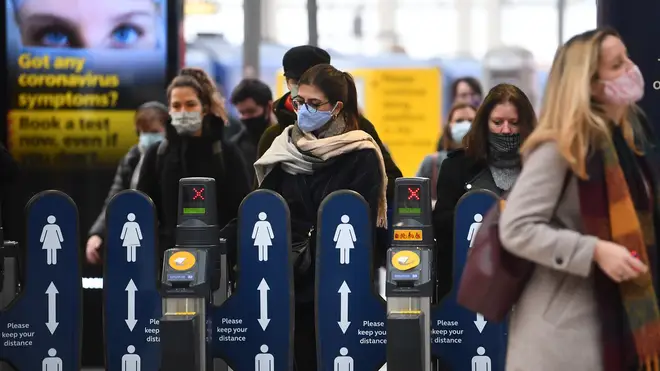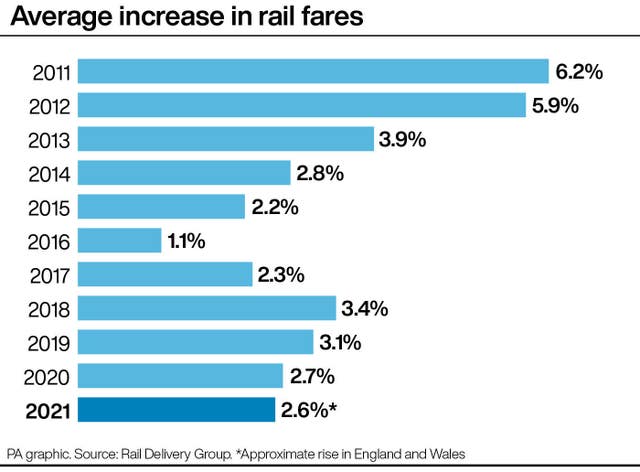
Ian Payne 4am - 7am
28 February 2021, 12:24

Ticket prices in England and Wales will increase by an average of around 2.6%.
Rail passengers in England and Wales will be hit by above inflation fare rises on Monday.
Ticket prices will increase by around 2.6%, leading to accusations that the UK Government is “pricing the railways out of existence”.
The figure represents the Retail Prices Index measure of inflation from July 2020, plus one percentage point.
Passengers in Wales face a similar increase, whereas the Scottish Government is implementing smaller rises of 1.6% and 0.6% for peak and off-peak travel respectively.
Examples of the potential fare hikes include a Brighton-London annual season ticket going up by £129 to £5,109 and a Manchester-Glasgow off-peak return rising by £2.30 to £90.60.

Exact prices will be released on Monday.
Fare rises in England have mirrored RPI since January 2014, but the Department for Transport (DfT) axed the policy due to the “unprecedented taxpayer support” handed to the rail industry during the coronavirus pandemic.
The UK, Scottish and Welsh governments took over rail franchise agreements from train operators in March 2020, following the collapse in demand for travel caused by the virus crisis.
This is expected to cost the Westminster Government alone around £10 billion by mid-2021.
Fares usually become more expensive on the first working day of every year, but the 2021 rise was deferred due to the coronavirus pandemic.
Bruce Williamson, of pressure group Railfuture, described the increase as “the usual annual punishment for rail passengers, just slightly delayed”.
He claimed the UK Government “should be encouraging the public to start using trains again” when lockdown restrictions ease.
“But instead they’re gradually pricing the railways out of existence,” he said. “It just doesn’t make sense to kick the rail industry when it’s down.”
TUC general secretary Frances O’Grady warned that the increase in the cost of rail travel “will not help commuters and city centres recover from the pandemic”.
She said: “The Government needs a credible plan for the future of rail that gives passengers better value.”
The Liberal Democrats’ transport spokesperson Sarah Olney called for responsibility for setting rail fares to be handed to a new independent Railway Agency mandated to keep prices low.
She said: “It is appalling that yet again people are being hit by another grossly unfair Government-approved hike in rail fares.”
Rises in around half of fares – including season tickets on most commuter routes – are regulated by the UK, Scottish and Welsh governments.
Train operators determine increases in unregulated fares such as Advance tickets, but this year they are heavily linked to rises in regulated tickets as governments have taken on firms’ financial liabilities.
That means the overall average increase across England and Wales is around 2.6%.
A DfT spokeswoman noted that this is the lowest rise in four years “despite unprecedented taxpayer support for the rail industry”.
She went on: “By delaying the change in fares, passengers who needed to renew season tickets were able to get a better deal, and we will set our further plans to offer cheaper, more flexible tickets for commuters in due course.”
Robert Nisbet, director of nations and regions at industry body the Rail Delivery Group, said it is up to the Government to decide “how much it wants passengers to pay towards the cost of running the railway”.
He added that train operators want to give passengers “better value” by working with ministers to create a “new, more flexible” ticketing system.